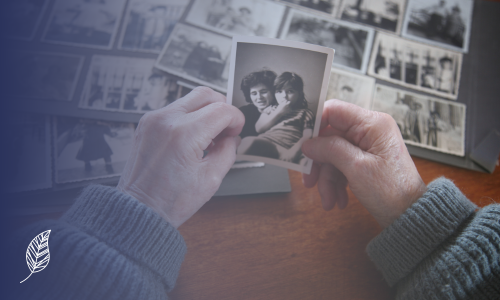 What is Reminiscence Therapy?
What is Reminiscence Therapy?
The Elder Care Alliance describes reminiscence therapy (RT) as “a treatment that uses all the senses — sight, touch, taste, smell, and sound — to help individuals with dementia remember events, people, and places from their past lives.”
Reminiscence Therapy is a powerful tool that brings a sense of value, contentment, and peace to seniors with dementia. By revisiting their past, they can relive joyous moments helping them to foster a deep emotional connection.
With dementia, people typically lose short-term memory but can recall older memories very often. Reminiscence Therapy allows them to share something meaningful about themselves rather than always listening to others. It gives them a feeling of success and confidence because they can be an active part of the conversation.
The Benefits of Reminiscence Therapy
Reminiscence therapy offers a range of benefits for individuals living with dementia, including:
- Improved mood: Revisiting your past can evoke feelings of happiness, satisfaction, and contentment, which can help alleviate depression and anxiety.
- Enhanced self-esteem: Recalling past achievements, successes, and meaningful relationships can boost self-esteem and create a sense of self-worth.
- Increased cognitive function: Engaging in reminiscence activities can improve memory retrieval, problem-solving, and communication skills.
- Validation and sense of identity: Reminiscing about one’s life experiences can provide validation of personal identity.
- Social interaction: Reminiscing with others can facilitate socialization and connection with others which reduces feelings of loneliness and isolation.
- Family and caregiver involvement: This therapy can also involve family members and caregivers, fostering deeper understanding, empathy, and connection between individuals and their support networks.
By promoting psychological well-being, enhancing social engagement, and providing a sense of purpose and meaning, reminiscence therapy contributes to overall improvements in quality of life for participants.
Reminiscing vs. Remembering
It’s important to note that reminiscing is not the same as asking someone to remember something. Reminiscing is a gentle process that allows seniors with dementia to share their past experiences in a comfortable and non-pressured environment. Remembering something specific can be stressful for someone with dementia because they are likely to feel pressured.
How Does Reminiscence Therapy Work?
Like all types of therapy, a typical reminiscence therapy session can vary depending on the individual’s need. It can be as simple as having a conversation with a caregiver or family member. It can also be more structured and complex and involve meetings with a therapist or counselor.
Music can play a big role in RT. It can create a bridge to past experiences and memories, enhancing the effectiveness of the therapy.
Photo albums, keepsake albums, magazines, and picture books can all help to stimulate memories. Pictures of family and friends and significant life events that bring up memories are excellent ways to reminisce and spend meaningful time together. Sharing Memories is not just a therapeutic activity, it’s a beautiful way to forge a deeper emotional connection with those living with dementia.





